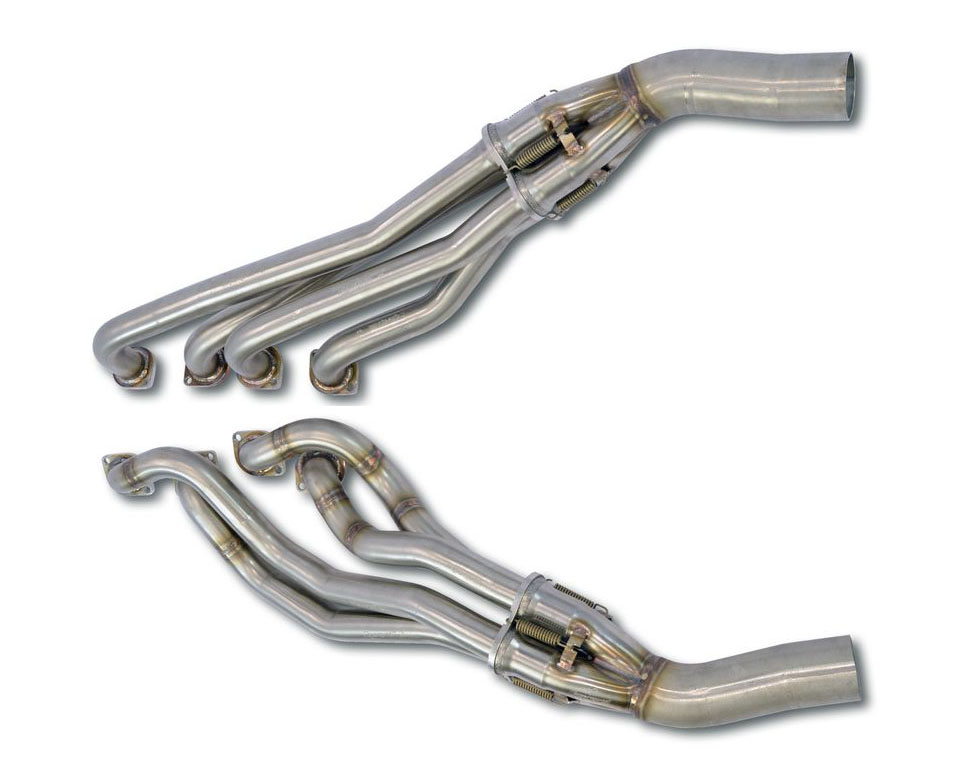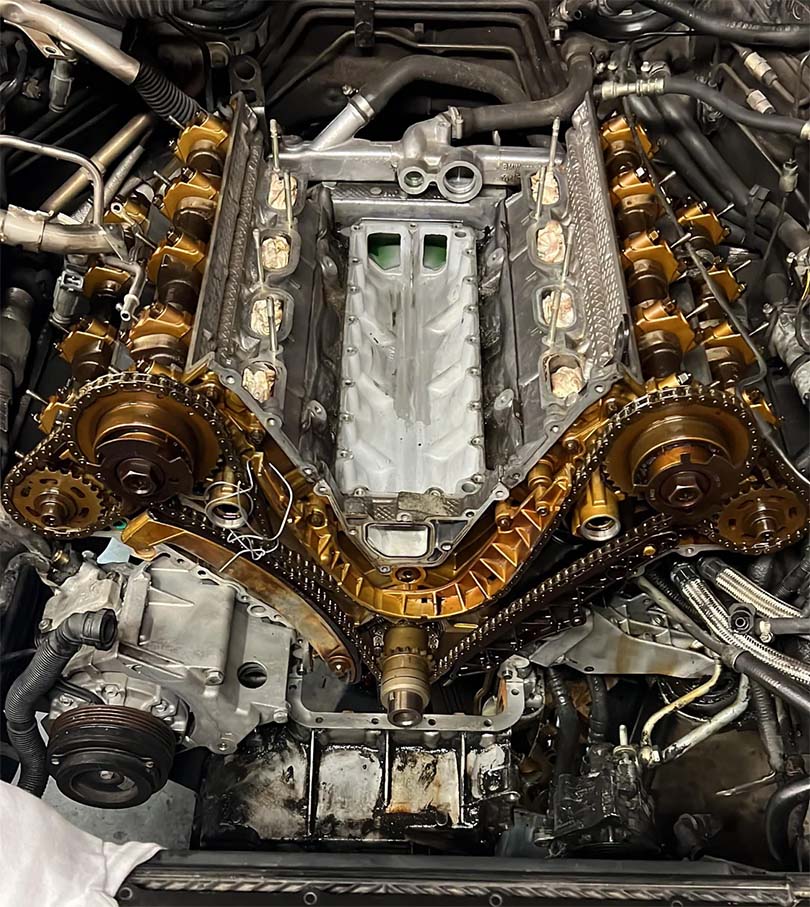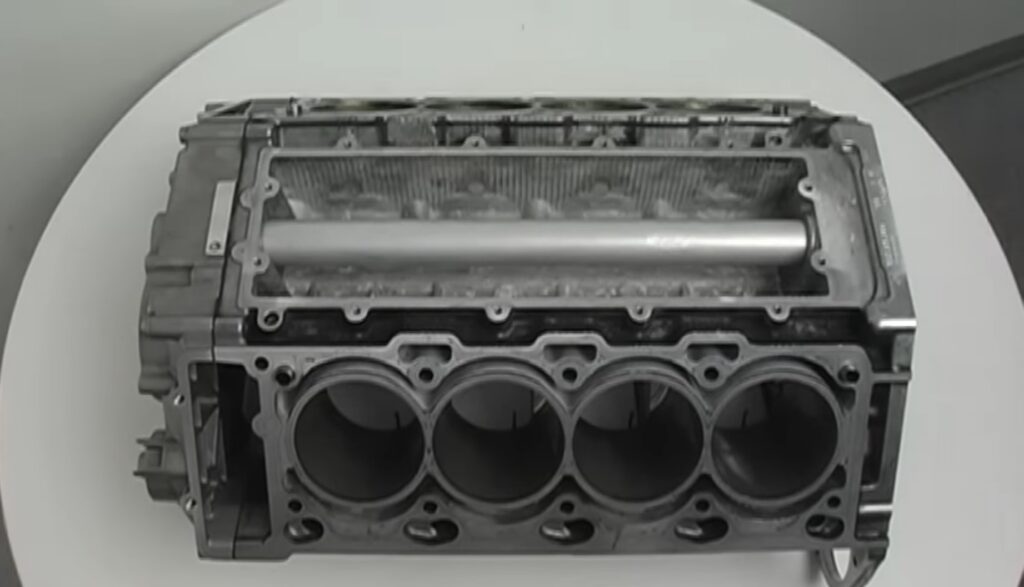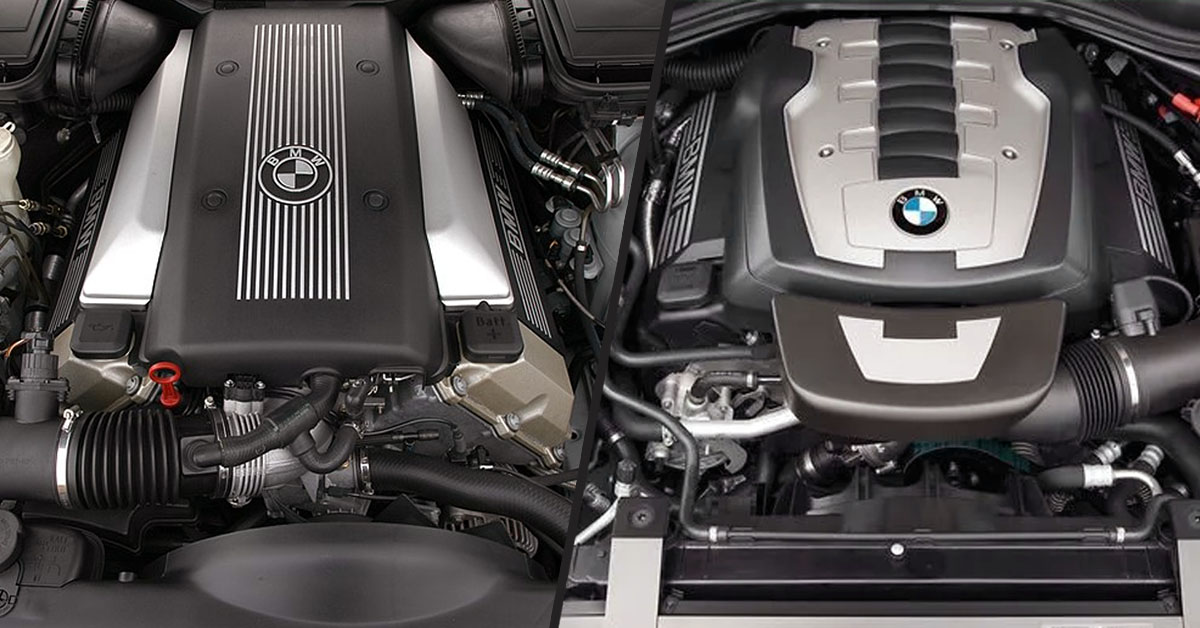Although BMW is renowned for its inline 6s, they’ve made some legendary V8 engines. The M62 and N62 are the last naturally-aspirated V8 engines designed by BMW. These engines powered upper trims of full-size sedans and SUVs like the E39 540i, E60 550i, and the X5 4.8i.
In 2001, BMW started phasing out the M62 in favor of a brand-new V8 replacement, the N62. The new engine brought efficiency and power output improvements over its predecessor and introduced a more advanced VANOS system and Valvetronic. How do they stack against each other?
Let’s delve deep into both of these engines, comparing their specifications, horsepower, reliability, sound, and tuning potential. BMW M62 vs N62 engine comparison.
BMW M62 vs. N62: Specifications
| M62TUB44 | N62B48 | |
|---|---|---|
| Horsepower | 280 hp @ 5,400 RPM | 362 hp @ 6,300 RPM |
| Torque | 325 lb-ft @ 3,600 RPM | 361 lb-ft @ 3,400 RPM |
| Configuration | Naturally-aspirated V8 | Naturally-aspirated V8 |
| Displacement | 4.4L | 4.8L |
| Bore and Stroke | 92mm x 82.7mm | 93mm x 88.3mm |
| Redline | 6,100 RPM | 6,500 RPM |
| VANOS system | Single VANOS (intake camshaft) | Double VANOS |
| Years Produced | 1996-2005 | 2001-2010 |
M62 vs. N62: Horsepower & Torque
The M62 outputs a peak horsepower of 280 hp at 5,400 RPM. That is a very respectable figure for a 90’s V8 and it provides great performance in a full-size sedan like the E39. However, when compared to the N62’s 362 hp, the power difference is evident. The N62 boasts almost an 80 horsepower advantage, putting out 362 hp at 6,300 RPM.
The N62 outputs considerably more horsepower and torque
In terms of torque, the difference is more subtle, with the N62 offering a slight edge. The M62 has a torque of 325 lb-ft at 3,600 RPM while the N62 outputs 361 lb-ft at 3,400 RPM.
The N62 is not only more powerful on the upper end of the RPM band but also generates more torque at lower RPMs than the M62. Truly impressive figures for a NA V8 from the mid-2000s.
Winner: N62
M62 vs. N62: Tuning & mods
While both the M62 and N62 may not have the extensive tuning headroom of modern BMW turbocharged V8s like the N63, they still have some tuning potential.
Upgrading headers, opting for a less restrictive exhaust system, and applying a tune can potentially boost performance by 20-30hp.

Forced induction is the best bolt-on you can install on either of these engines and will completely transform the way they deliver power. However, a good supercharged kit with ancillary accessories can cost upwards of $10K, and at that point, you might want to consider a different powertrain that you can easily tune, like the N63.
Winner: Tie
M62 vs. N62: Exhaust Sound
Both engines deliver that characteristic naturally-aspirated V8 “German muscle” sound, and in stock form, they sound very similar. However, the M62 tends to output a deeper rumble that resembles its high-performance sibling, the S62.
The N62 on the other hand still has that characteristic old-school V8 rumble but it can get raspier at high RPMs. It may be due to the higher redline and its rev-happy nature.
If we had to pick one in terms of pure engine sound, it would have to be the M62. It sounds similar to the S62 and that is all we need from a V8.
Winner: M62
M62 vs. N62: Reliability & Common Issues
In terms of pure long-term reliability, the M62 generally edges out the N62 due to its simpler design. Despite its timing chain issues at high mileage, you are less likely to have issues with this engine, and maintenance is less labor-intensive.
It’s worth noting that both engines are high-maintenance and the latest engines that rolled out of the production line are now almost 15 years old. Engine components like gaskets, and water pumps may be on their way out even on low-mileage samples.
M62 Common Issues:
- Timing Chain Guides: A known weak point, these plastic timing chain guides will eventually fail. At high mileage, an M62 will require a new timing chain, tensioner, and timing chain guides.
- VANOS Issues: The early VANOS system of the M62 can have issues. A symptom can be a noisy VANOS on startup and it can sound similar to a bad timing chain.

N62 Common Issues:
- Valve Stem Seals: The valve stem seals of the N62 are its most common issue. Worn valve stem seals can lead to smoking, oil consumption, and engine damage if left unchecked.
- Transfer Pipe Coolant Leak: BMW over-engineering at its finest. This coolant pipe that runs through the V8 of the engine can start to leak and burn coolant around the area.
- Alternator Bracket Gasket Oil Leak: Typical of a BMW of the era. The alternator bracket gasket will start seeping oil.
- Other Leaks: Typical of BMWs, these engines might experience leaks from the valve cover gasket.

BMW doesn’t make very reliable V8’s, and these two engines are no exception. The M62 is still a more reliable option with generally lower running costs. If you’re looking for the absolute best reliability, stick to proven inline-6s like the M54 or the N52.
Winner: M62
M62 vs. N62: Additional Technical Differences
- Valvetronic System:
- M62: Does not feature the Valvetronic system.
- N62: First BMW V8 to have Valvetronic, a variable valve lift system. By varying the valve lift, the need for a traditional throttle body is eliminated, and this results in reduced pumping losses, improved throttle response, and increased fuel efficiency.
- Variable Valve Timing (VANOS):
- M62: Single VANOS system controlling only the intake camshaft (M62TU only).
- N62: Utilizes a double VANOS system controlling both the intake and exhaust camshafts.
- Construction and Design:
- M62: Features an aluminum block with Alusil cylinder liners and an aluminum cylinder head.
- N62: Continues with the aluminum block but introduces a more compact and lighter design. Changes in the N62 also include a revised cooling system and the incorporation of a bedplate for increased rigidity.
- Secondary Air System:
- M62: Uses an external air pump for the secondary air system.
- N62: Integrates the secondary air pump into the cylinder head, which reduces complexity and potential failure points.
- Intake Manifold:
- M62: Features a traditional intake manifold.
- N62: Introduces a variable-length intake manifold, optimizing performance across a broader RPM range.
- Engine Management:
- M62: Managed by the Siemens MS 4.4 or Bosch ME 7.2 system.
- N62: Uses the more advanced Siemens MSV70 system.
Conclusion: Is the N62 a worthy successor to the M62?
While the N62 outputs more power, is more fuel efficient and has more advanced technology, the M62 shines for its reliability and exhaust note. If reliability ranks higher on your list and you cherish that classic deep V8 rumble, the M62 might be the way to go. On the other hand, those yearning for a potent blend of technology and raw power might gravitate towards the N62.
Sources:

